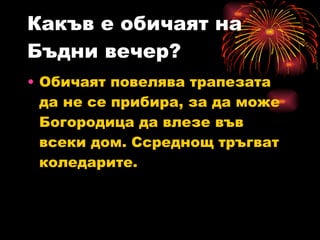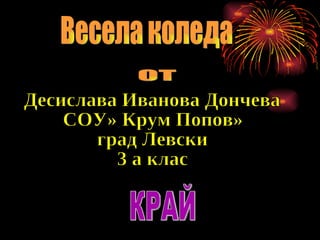1 of 9
Downloaded 23 times









Ad
Recommended
–ü—Ä–æ–µ–∫—Ç –∑–∞ –ö–æ–ª–µ–¥–∞ –Ω–∞ –ü—Ä–µ—Å–ª–∞–≤
–ü—Ä–æ–µ–∫—Ç –∑–∞ –ö–æ–ª–µ–¥–∞ –Ω–∞ –ü—Ä–µ—Å–ª–∞–≤NinaKaneva
Ã˝
–ú–∞—Ç–µ—Ä–∏–∞–ª–∏ –ø–æ –ø—Ä–æ–µ–∫—Ç "–£—Å–ø–µ—Ö"–ü—Ä–æ–ª–µ—Ç–Ω–∏ –ø—Ä–∞–∑–Ω–∏—Ü–∏ 1.–∫–ª–∞—Å
–ü—Ä–æ–ª–µ—Ç–Ω–∏ –ø—Ä–∞–∑–Ω–∏—Ü–∏ 1.–∫–ª–∞—ÅLuiza Antova
Ã˝
–ü—Ä–æ–ª–µ—Ç–Ω–∏ –ø—Ä–∞–∑–Ω–∏—Ü–∏ 1.–∫–ª–∞—Å–ü—Ä–æ–µ–∫—Ç –∑–∞ –ö–æ–ª–µ–¥–∞ –Ω–∞ –í–∏–∫—Ç–æ—Ä
–ü—Ä–æ–µ–∫—Ç –∑–∞ –ö–æ–ª–µ–¥–∞ –Ω–∞ –í–∏–∫—Ç–æ—ÄNinaKaneva
Ã˝
–ú–∞—Ç–µ—Ä–∏–∞–ª–∏ –ø–æ –ø—Ä–æ–µ–∫—Ç "–£—Å–ø–µ—Ö"–ú–æ–º–µ–Ω—Ç–∏ –æ—Ç –∂–∏–≤–æ—Ç–∞ –≤ –≥—Ä—É–ø–∞ "–°–ª—ä–Ω—á–∏—Ü–µ" –í–∞—Ä–Ω–∞ –Ü–Ü —á–∞—Å—Ç
–ú–æ–º–µ–Ω—Ç–∏ –æ—Ç –∂–∏–≤–æ—Ç–∞ –≤ –≥—Ä—É–ø–∞ "–°–ª—ä–Ω—á–∏—Ü–µ" –í–∞—Ä–Ω–∞ –Ü–Ü —á–∞—Å—Ç–ì—Ä—É–ø–∞ –°–ª—ä–Ω—á–∏—Ü–µ –í–∞—Ä–Ω–∞
Ã˝
–ï—Ç–æ —Ç–∞–∫–∞ –Ω–µ—É—Å–µ—Ç–Ω–æ –ø—Ä–µ–º–∏–Ω–∞ –∏ —Ç—Ä–µ—Ç–∞—Ç–∞ –≥–æ–¥–∏–Ω–∞ –≤ –î–µ—Ç—Å–∫–∞—Ç–∞ –≥—Ä–∞–¥–∏–Ω–∞!&±Á≥‹¥«≥Ÿ;–°—É—Ä–≤–∞–∫–∞—Ä–∏&±Á≥‹¥«≥Ÿ;
&±Á≥‹¥«≥Ÿ;–°—É—Ä–≤–∞–∫–∞—Ä–∏&±Á≥‹¥«≥Ÿ;–î–∏–º–∏—Ç—Ä–∏–π–∫–∞ –í—É—á–∫–æ–≤–∞
Ã˝
"–¶–≤–µ—Ç–æ–≤–µ—Ç–µ –Ω–∞ —Å—É—Ä–≤–∞—á–∫–∞—Ç–∞"Christmas traditions and holidays - Kindergarten "Slync" - Levski - group "Mi...
Christmas traditions and holidays - Kindergarten "Slync" - Levski - group "Mi...Sevdie Alieva
Ã˝
Christmas traditions and holidays - Kindergarten "Slynce" - Levski
group "Mickey Mouse"More Related Content
What's hot (20)
–ü—Ä–æ–µ–∫—Ç –∑–∞ –ö–æ–ª–µ–¥–∞ –Ω–∞ –ü—Ä–µ—Å–ª–∞–≤
–ü—Ä–æ–µ–∫—Ç –∑–∞ –ö–æ–ª–µ–¥–∞ –Ω–∞ –ü—Ä–µ—Å–ª–∞–≤NinaKaneva
Ã˝
–ú–∞—Ç–µ—Ä–∏–∞–ª–∏ –ø–æ –ø—Ä–æ–µ–∫—Ç "–£—Å–ø–µ—Ö"–ü—Ä–æ–ª–µ—Ç–Ω–∏ –ø—Ä–∞–∑–Ω–∏—Ü–∏ 1.–∫–ª–∞—Å
–ü—Ä–æ–ª–µ—Ç–Ω–∏ –ø—Ä–∞–∑–Ω–∏—Ü–∏ 1.–∫–ª–∞—ÅLuiza Antova
Ã˝
–ü—Ä–æ–ª–µ—Ç–Ω–∏ –ø—Ä–∞–∑–Ω–∏—Ü–∏ 1.–∫–ª–∞—Å–ü—Ä–æ–µ–∫—Ç –∑–∞ –ö–æ–ª–µ–¥–∞ –Ω–∞ –í–∏–∫—Ç–æ—Ä
–ü—Ä–æ–µ–∫—Ç –∑–∞ –ö–æ–ª–µ–¥–∞ –Ω–∞ –í–∏–∫—Ç–æ—ÄNinaKaneva
Ã˝
–ú–∞—Ç–µ—Ä–∏–∞–ª–∏ –ø–æ –ø—Ä–æ–µ–∫—Ç "–£—Å–ø–µ—Ö"–ú–æ–º–µ–Ω—Ç–∏ –æ—Ç –∂–∏–≤–æ—Ç–∞ –≤ –≥—Ä—É–ø–∞ "–°–ª—ä–Ω—á–∏—Ü–µ" –í–∞—Ä–Ω–∞ –Ü–Ü —á–∞—Å—Ç
–ú–æ–º–µ–Ω—Ç–∏ –æ—Ç –∂–∏–≤–æ—Ç–∞ –≤ –≥—Ä—É–ø–∞ "–°–ª—ä–Ω—á–∏—Ü–µ" –í–∞—Ä–Ω–∞ –Ü–Ü —á–∞—Å—Ç–ì—Ä—É–ø–∞ –°–ª—ä–Ω—á–∏—Ü–µ –í–∞—Ä–Ω–∞
Ã˝
–ï—Ç–æ —Ç–∞–∫–∞ –Ω–µ—É—Å–µ—Ç–Ω–æ –ø—Ä–µ–º–∏–Ω–∞ –∏ —Ç—Ä–µ—Ç–∞—Ç–∞ –≥–æ–¥–∏–Ω–∞ –≤ –î–µ—Ç—Å–∫–∞—Ç–∞ –≥—Ä–∞–¥–∏–Ω–∞!&±Á≥‹¥«≥Ÿ;–°—É—Ä–≤–∞–∫–∞—Ä–∏&±Á≥‹¥«≥Ÿ;
&±Á≥‹¥«≥Ÿ;–°—É—Ä–≤–∞–∫–∞—Ä–∏&±Á≥‹¥«≥Ÿ;–î–∏–º–∏—Ç—Ä–∏–π–∫–∞ –í—É—á–∫–æ–≤–∞
Ã˝
"–¶–≤–µ—Ç–æ–≤–µ—Ç–µ –Ω–∞ —Å—É—Ä–≤–∞—á–∫–∞—Ç–∞"Christmas traditions and holidays - Kindergarten "Slync" - Levski - group "Mi...
Christmas traditions and holidays - Kindergarten "Slync" - Levski - group "Mi...Sevdie Alieva
Ã˝
Christmas traditions and holidays - Kindergarten "Slynce" - Levski
group "Mickey Mouse"–ú–æ–º–µ–Ω—Ç–∏ –æ—Ç –∂–∏–≤–æ—Ç–∞ –≤ –≥—Ä—É–ø–∞ "–°–ª—ä–Ω—á–∏—Ü–µ" –í–∞—Ä–Ω–∞ –Ü–Ü —á–∞—Å—Ç
–ú–æ–º–µ–Ω—Ç–∏ –æ—Ç –∂–∏–≤–æ—Ç–∞ –≤ –≥—Ä—É–ø–∞ "–°–ª—ä–Ω—á–∏—Ü–µ" –í–∞—Ä–Ω–∞ –Ü–Ü —á–∞—Å—Ç–ì—Ä—É–ø–∞ –°–ª—ä–Ω—á–∏—Ü–µ –í–∞—Ä–Ω–∞
Ã˝
Viewers also liked (20)
–¶–í–ï–¢–û–í–ï–¢–ï –ù–ê –î–™–ì–ê–¢–ê
–¶–í–ï–¢–û–í–ï–¢–ï –ù–ê –î–™–ì–ê–¢–ê–ø–µ–ø–∞ —á–∞–≤–¥–∞—Ä–æ–≤–∞
Ã˝
–ú–ò–ù–ò –ü–†–û–ï–ö–¢ –ù–ê –ì–†–£–ü–ê " –ú–û–†–Ø–ß–ï"
2012 - 2013 –ì–û–î. " –¶–í–ï–¢–û–í–ï–¢–ï –ù–ê –î–™–ì–ê–¢–ê"CAR Email 5.16.03
CAR Email 5.16.03Obama White House
Ã˝
The document is an email from Harvey Reid at the EPA sending a response from the EPA to CEI (Competitive Enterprise Institute) regarding their letter on the Climate Action Report. It was sent to various individuals at government agencies. Attached is a PDF document containing the EPA's response. The email also provides links to pages on the EPA website that have been modified to reference the Climate Action Report as a State Department document.APP Email 7.27.05 (b)
APP Email 7.27.05 (b)Obama White House
Ã˝
The United States is set to announce a new pact called "Beyond Kyoto" to combat climate change by developing energy technologies. The pact includes the US, China, India, Australia, and South Korea and aims to cut greenhouse gas emissions without setting strict targets. It will be formally announced the next day by the US Deputy Secretary of State and representatives of the other countries. While some see it as a useful step, others are critical that it could divert funds away from renewable technologies and undermine the Kyoto Protocol.APP Email 10.24.05 (a)
APP Email 10.24.05 (a)Obama White House
Ã˝
1) Australia said it has not set a date for hosting the inaugural summit of the Asia-Pacific Partnership on Clean Energy Development, dealing a setback to the US-backed effort.
2) The partnership was launched in July to develop clean energy technologies as a more effective alternative to the Kyoto Protocol, but critics see it as an attempt to undermine Kyoto.
3) While the summit was scheduled for November in Adelaide, Australia, the environment minister said no date has been set, with a senior official saying it has been postponed until at least January due to lack of progress developing clean technologies.Crew, Foia, Documents 011447 - 011492(part 1)
Crew, Foia, Documents 011447 - 011492(part 1)Obama White House
Ã˝
Citizen's for Responsiblity and Ethics in Washington
FOIA (DOJ)
Documents 011447 - 011492(part 1)How web standards to save you time and money
How web standards to save you time and moneywelovenicethings
Ã˝
The document discusses the benefits of web standards, emphasizing time and cost savings due to less code, increased accessibility, and improved maintenance. It highlights the importance of web standards for search engine optimization and reaching diverse audiences, asserting that standards-based websites perform better on mobile devices. Additionally, it mentions the success of the British Museum's website in achieving recognition for its accessibility efforts.CAR Email 7.11.02
CAR Email 7.11.02Obama White House
Ã˝
This document is an email containing news clips from various sources on topics related to the environment sent from Janice Sinclair at EPA to multiple EPA recipients on July 11, 2002. It includes 3 attachments: a news clip index, HTML file with full news articles, and a links file. The body provides a hex dump of the attachments that could not be converted to ASCII text. The attachments contain news articles on various environmental topics from air quality and arsenic to climate change and energy efficiency programs.CAR Email 7.17.03
CAR Email 7.17.03Obama White House
Ã˝
This document summarizes and forwards an email from "S. Fred Singer" discussing various topics related to climate change and global warming. The email discusses recent news articles and studies that question the degree of scientific consensus around human-caused climate change. It argues that climate models have high uncertainties and that some climate alarmists have exaggerated risks and uncertainties to advocate for policy actions like the Kyoto Protocol. The document criticizes some climate scientists and activists for altering official reports to overstate evidence of climate impacts and for justifying advocacy as their role even when it compromises ethics and objectivity in journalism.CAR Email 6.10.02 (a)
CAR Email 6.10.02 (a)Obama White House
Ã˝
The document summarizes a New York Times editorial and letter to the editor regarding President Bush's stance on climate change. The editorial criticizes Bush for dismissing a climate report by his own experts that found human activities are largely responsible for global warming. The letter defends Bush, saying his policies appropriately address the current scientific understanding of climate change by investing in research and programs to curb emissions.APP Email 7.28.05 (a)
APP Email 7.28.05 (a)Obama White House
Ã˝
Klaus Toepfer, the Executive Director of the United Nations Environment Programme, welcomed a new climate initiative led by the United States to work with Australia and Asian countries to reduce greenhouse gas emissions. He said developing countries need efficient energy technologies to lift populations out of poverty without harming the environment. The US recognizes that dependence on fossil fuels is economically burdensome and that diversifying energy supplies with cleaner coal, renewables, and efficiency makes sense. However, the initiative does not replace legally binding emissions reductions under the Kyoto Protocol and more investment is still needed to help vulnerable countries adapt to climate change. Technological change as promoted by this initiative could stimulate industries and research to lead to cleaner energy systems, if it meaningfully reducesEi Lab4
Ei Lab4rolandv
Ã˝
The Educational Informatics Lab (EILab) is part of the Multimedia Innovation Lab (MILab) at the University of Ontario Institute of Technology. The EILab conducts research on e-learning, computer-mediated communication, and online education with a focus on learner-driven approaches rather than content-driven teaching. The lab has several research projects studying online learning and develops open source educational software. It has facilities at two locations connected by fiber optic cable for videoconferencing and remote learning research. The EILab is funded through various sources including government grants and corporate partnerships.Letter from American Chemistry Council 12.24.02 (a)
Letter from American Chemistry Council 12.24.02 (a)Obama White House
Ã˝
The document is a response from the American Chemistry Council (ACC) outlining the US chemical industry's commitment to reducing greenhouse gas intensity as part of President Bush's Global Climate Business Challenge.
Some key points:
- The chemical industry has already reduced the fuel and power energy consumed per unit of output by 41% since 1974 and carbon emissions per unit of output have declined over 45% during this period through improved energy efficiency.
- As part of its response, the ACC commits the industry to pursuing additional reductions in greenhouse gas intensity toward an 18% reduction target by 2012 compared to a 1990 baseline. It will collect annual member data and reports to measure progress.
- The industry will continue developing products that helpCAR Email 06.05.02 (a)
CAR Email 06.05.02 (a)Obama White House
Ã˝
This document is an email from Dan Reifsnyder at the State Department to Phil Cooney at the White House Council on Environmental Quality. It forwards a link to an article from the Competitive Enterprise Institute announcing that the institute has filed a petition to prevent distribution of a flawed White House climate report. The full text of the forwarded article is included.The Benefits of Six
The Benefits of Sixghornet
Ã˝
The document reports a 6% increase in staff interaction alongside a significant rise in community population, highlighting the effectiveness of engagement strategies. It notes that measuring response types shows an average response time of 6 minutes during core business hours. Additionally, there has been a reduction in marketing engagement due to fewer internal 'broadcast' emails.CAR Email 6.4.02
CAR Email 6.4.02Obama White House
Ã˝
The document discusses a controversy over changes in the Bush administration's position on global warming based on a report from the EPA. The summary argues:
1) The New York Times story on the EPA report seemed designed to create confrontation and justify front-page coverage by exaggerating minor differences in wording.
2) The story implied the report was a deliberate shift by Bush to improve his environmental credentials, but offered little evidence and sources suggested otherwise.
3) The controversy was likely manufactured and exaggerated by environmental groups and the Times in an attempt to embarrass the Bush administration, rather than a significant change in policy.Letter from City of Austin 10.4.02
Letter from City of Austin 10.4.02Obama White House
Ã˝
The Large Public Power Council (LPPC) CEOs agreed to participate in a voluntary greenhouse gas reduction plan in support of the President's climate change strategy. The attached documents outline public powers' proposed GHG reduction plan and timeline. The plan seeks credible, verifiable mitigation measures through voluntary programs and partnerships between various groups. Public power will work with environmental organizations and local governments on collaborative projects to reduce emissions.Joyceepsteinparentinvolvement
JoyceepsteinparentinvolvementKathyRees
Ã˝
The document discusses strategies to increase parental involvement at St. Helen Elementary School. It outlines the school's parental involvement policy and mission statement. It also describes the parent advisory committee that provides input on the schoolwide plan. Finally, it discusses strategies to communicate with parents, promote parenting skills, and assist student learning based on Dr. Joyce Epstein's six standards of parental involvement.August 1973 The Third Annual Report Of The Council On Environmental Quality
August 1973 The Third Annual Report Of The Council On Environmental QualityObama White House
Ã˝
The document outlines the key features and benefits of a new software product. It highlights how the software improves efficiency and productivity for businesses. Additionally, it includes user testimonials and case studies that showcase its successful implementation.Ad
More from –ì–∞–ª—è –õ—é–±–µ–Ω–æ–≤–∞ (9)
Ad
Desislava doncheva levski3
- 2. –ö–ê–ö–í–û –ü–†–ê–í–ò–ú –ù–ê –ë–™–î–ù–ò –í–ï–ß–ï–†? –ù–∞ –±—ä–¥–Ω–∏ –≤–µ—á–µ—Ä, –≤ –Ω–æ—â—Ç–∞ —Å—Ä–µ—â—É –ö–æ–ª–µ–¥–∞, —Ü—è–ª–æ—Ç–æ —Å–µ–º–µ–π—Å—Ç–≤–æ —Å–µ —Å—ä–±–∏—Ä–∞ –Ω–∞ –ø—Ä–∞–∑–Ω–∏—á–Ω–∞—Ç–∞ –≤–µ—á–µ—Ä—è.
- 3. –ü–æ—Å—Ç–Ω–∏ —è—Å—Ç–∏—è –ù–∞ —Ç—Ä–∞–ø–µ–∑–∞—Ç–∞ —Å–µ –ø–æ—Å—Ç–∞–≤—è—Ç –Ω–µ—á–µ—Ç–µ–Ω –±—Ä–æ–π-—Å–µ–¥–µ–º,–¥–µ–≤–µ—Ç –∏–ª–∏ –¥–≤–∞–Ω–∞–¥–µ—Å–µ—Ç, –ø–æ—Å—Ç–Ω–∏ —è—Å—Ç–∏—è.
- 4. –ö–∞–∫—ä–≤ –µ –æ–±–∏—á–∞—è—Ç –Ω–∞ –ë—ä–¥–Ω–∏ –≤–µ—á–µ—Ä? –û–±–∏—á–∞—è—Ç –ø–æ–≤–µ–ª—è–≤–∞ —Ç—Ä–∞–ø–µ–∑–∞—Ç–∞ –¥–∞ –Ω–µ —Å–µ –ø—Ä–∏–±–∏—Ä–∞, –∑–∞ –¥–∞ –º–æ–∂–µ –ë–æ–≥–æ—Ä–æ–¥–∏—Ü–∞ –¥–∞ –≤–ª–µ–∑–µ –≤—ä–≤ –≤—Å–µ–∫–∏ –¥–æ–º. –°—Å—Ä–µ–¥–Ω–æ—â —Ç—Ä—ä–≥–≤–∞—Ç –∫–æ–ª–µ–¥–∞—Ä–∏—Ç–µ.
- 5. –ö–æ–ª–µ–¥–Ω–∏ –≤–∫—É—Å–æ—Ç–∏–∏ –î—Ä—É–≥ –≤–∞–∂–µ–Ω –æ–±—Ä–µ–¥–µ–Ω –º–æ–º–µ–Ω—Ç –Ω–∞ –ö–æ–ª–µ–¥–Ω–∞—Ç–∞ —Ç—Ä–∞–ø–µ–∑–∞ –µ –±–∞–Ω–∏—Ü–∞—Ç–∞ —Å –¥—Ä–µ–Ω–æ–≤–∏ –∫–ª–æ–Ω–∫–∏.
- 6. –¢–æ–≤–∞ –µ –î—è–¥–æ –ö–æ–ª–µ–¥–∞
- 7. –ü–æ–¥–∞—Ä—ä—Ü–∏ —â–µ –∏–º–∞ –∑–∞ –≤—Å–∏—á–∫–∏ –¥–µ—Ü–∞!. –¢–æ–≤–∞ –µ –º–æ—è—Ç–∞ —Ä–∏—Å—É–Ω–∫–∞ –∑–∞ –î—è–¥–æ –ö–æ–ª–µ–¥–∞ .
- 8. –¢–æ–≤–∞ –µ –º–æ—è—Ç–∞ —Ä–∏—Å—É–Ω–∫–∞ –∑–∞ –ë—ä–¥–Ω–∏ –≤–µ—á–µ—Ä.
- 9. Весела коледа ОТ Десислава Иванова Дончева СОУ» Крум Попов» град Левски 3 а клас КРАЙ
